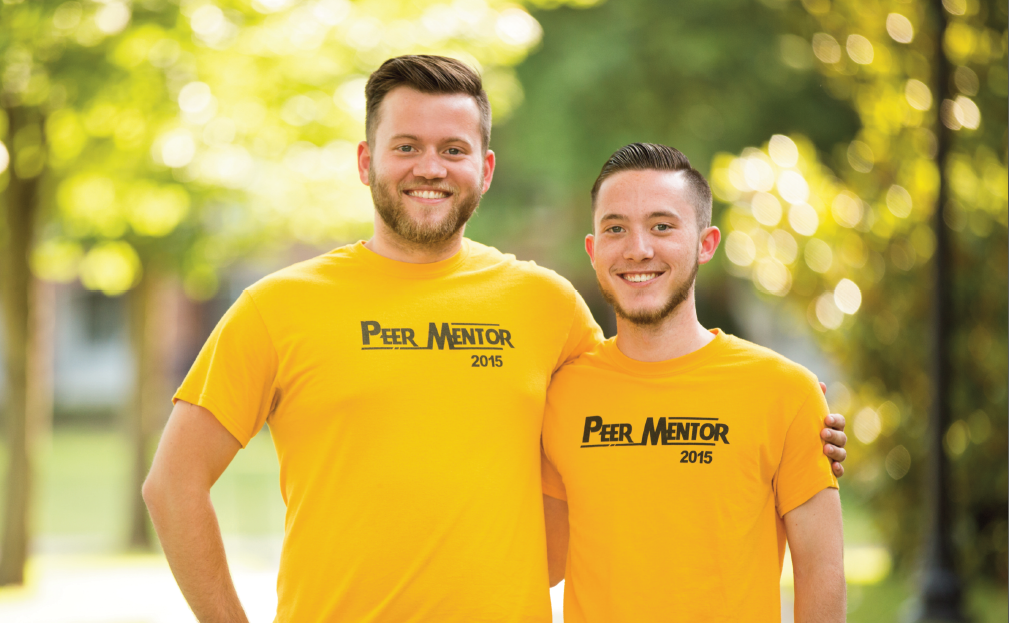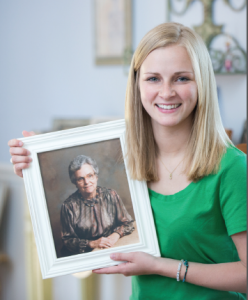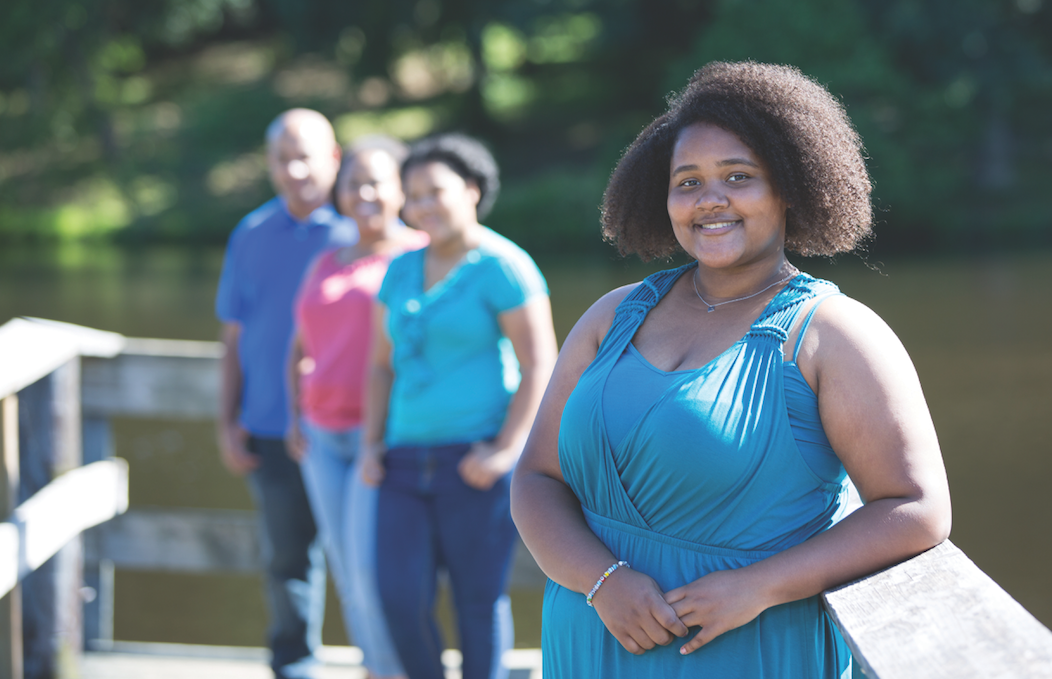
Jacob Brumfield ’16 (left) and his brother, John Brumfield ’18, are among the students attracted to Longwood because of family ties.
In the face of trends and tough competition, Longwood’s longtime values appeal to a new generation
BY MATTHEW MCWILLIAMS
When John Brumfield ’18 was considering colleges, the deciding factor wasn’t magazine rankings, a powerhouse football team or even following a big group of high-school friends. For Brumfield, like generations of Longwood students, it was that family mattered most.
Brumfield’s older brother, Jacob, graduated from Longwood with a nursing degree this May. Both brothers, of Gretna, carved out leadership roles—John as coordinator of New Lancer Days and Jacob as a peer mentor.
When Nicole Stevens ’17, a communications studies major from Fairfax, fell in love with Longwood, she

After she became interested in Longwood, Nicole Stevens ’17 discovered her late grandmother was an alumna.
discovered family ties here she never knew existed: Her grandmother, Laurine Ruth Billings, graduated from Longwood in 1934.
“I told my father that I had found a really cool school, and he told me that my grandmother went there,” she said. “Not only that, but my great-grandparents lived in Farmville, so my ties are strong. Now that I’ve been here for three years, it feels like I was always meant to be here, but just didn’t know it.”
In recent years, roughly 200 incoming freshmen each year have had family connections with other Longwood graduates. Those ties provide an essential sinew to Longwood— a sense of connection through time of family, of tradition and togetherness that is such a defining part of the student experience.
It may sound quaint, but in an age of evermore giant and online universities where that human touch is harder to come by, a sense of family is increasingly in demand from students, whether their Longwood histories are generations-old or just beginning.
Applications to Longwood surged 10 percent in 2015-16, contributing to a nearly 30 percent increase since 2011-12. The size of Longwood’s incoming class has been fairly consistent over those years—ranging from 950 to 1,100 students—but the application numbers suggest there is a strong and growing market for the qualities Longwood offers in this era of tumultuous change in higher education.
“As students and parents really dive into what they want out of higher education, many are returning to the idea of a holistic collegiate experience—the kind that Longwood has continually invested in,” said Jennifer Green, associate vice president for enrollment management and student success. “The very qualities that make Longwood so attractive to an increasingly large group of prospective students are what our students have found on campus for generations. In short, the kind of school Longwood always has been is very attractive to a lot of students now.” Guidance counselor Erica Lester Olinares ’12, who works with students at Dominion High School in Loudoun County, said parents are increasingly encouraging their children to enroll in a college that is “the right fit for them. I repeat that message when I meet with them. So many of our students who visit Longwood respond with excitement and come back talking about how they can see themselves feeling at home there.”
Perhaps the most remarkable development at Longwood in recent years is how new generations and populations are deciding they want to make Longwood their home.
Remarkably, applications from minority students have doubled since 2008, leading to a 35 percent increase in enrollment. This fall, for the fourth consecutive year, Longwood expects more than 200 members of the incoming freshman class to be nonwhite. For the first time in its history, Longwood is beginning to educate a student body that reflects the diversity of Virginia.
“The Longwood experience that people have cherished for generation after generation is now becoming available to a broader and broader array of people,” said President W. Taylor Reveley IV. “This is one of the most exciting things happening at Longwood now, perhaps the one that makes me proudest. Just walking across campus you can see with your own eyes a new and much more diverse generation of students not merely honoring and respecting the traditions and spirit that have been passed down through the generations here over 177 years, but actively embracing that spirit, and determined to leave their own mark before passing it down to those who will follow them.”
This fall, while roughly 200 incoming Longwood students will have Longwood family connections, nearly twice that many— at least 354—will be part of the first generation of their families to attend college. Deposits from legacy students are up 9 percent over the last four years, but growing at an even faster 12 percent clip are deposits from first generation students.

Chyanne Correa ’19, a member of the first generation of her family to attend
college, found the supportive atmosphere she was looking for in a college at Longwood.
Chyanne Correa ’19, herself a first-generation student, exhibited a rare amount of perspective for a 17-year-old when she was considering her options for higher education. For Correa and many other students like her, the college-search process entails navigating uncharted waters. Even so, Correa was looking for the same thing that thousands of Longwood students before her had wanted: a supportive, close-knit community. Ultimately, it was a desired course of study—speech pathology— that led her to Longwood, but it was the campus visit and interaction with a Longwood student ambassador that sealed the deal
“I was considering a different college, but my tour there was really impersonal,” said Correa, of Fredericksburg. “It was a huge contrast to Longwood, which really stood out as being welcoming and friendly. Everyone acted like a big family: Nearly everyone who passed our group said hello and smiled, which made me feel like I belonged already. From the beginning, it felt like a place I could grow and thrive.”
Thrive she has. She’ll start as a peer mentor in the spring, balancing those responsibilities with the academic rigors of upper-level coursework and participation in other clubs and organizations. But it hasn’t always come easy. Correa recalls a moment in her first semester when she turned in an admittedly subpar history paper.
“The professor took one look at it and told me to rewrite it,” she said. “So I went to the Writing Center, and they helped me a lot. We read through the paper together and fixed all of the major problems in a way that didn’t make me feel judged. It was really nice knowing that support was there when I needed it, and since then I’ve been back several times.”
Longwood’s supportive atmosphere has allowed generations of students to grow into the citizen leaders the university has become known for. And that, say guidance counselors, makes all the difference.
“I tell students, when a hospital has really good statistics, it’s not because of the patients who go into the hospital, but because of those who come out. And it’s the same with colleges,” said Olinares. “That’s backed up when they meet Longwood students, admissions officers and alumni out in the world. They start to understand why I take such pride in my school.”
